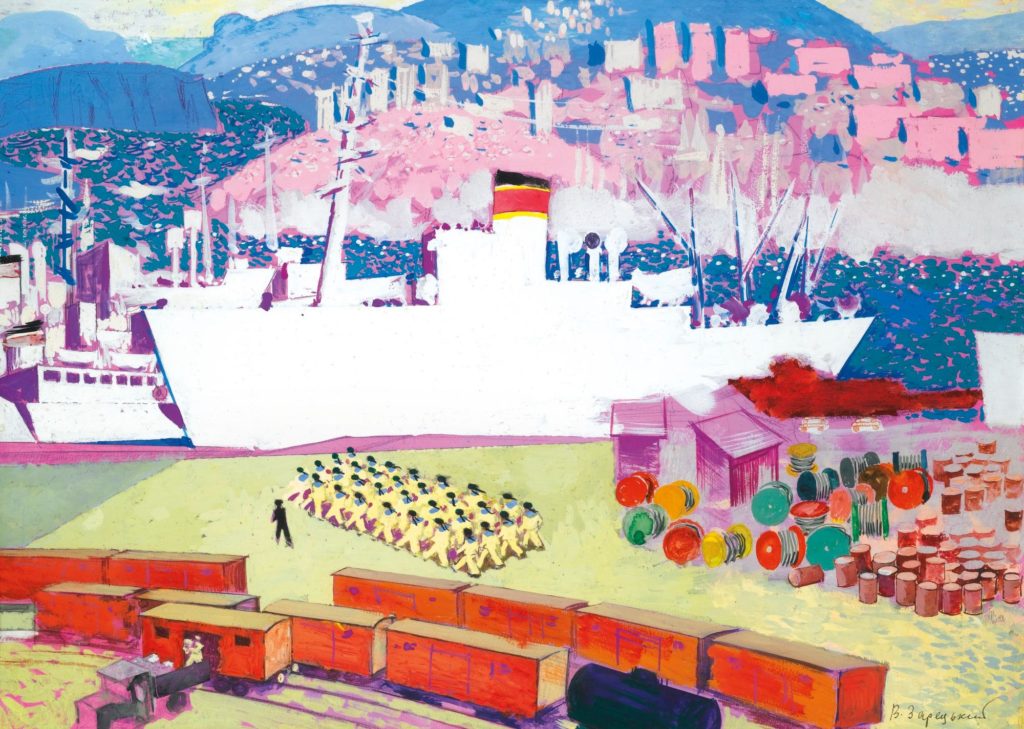“What kind of world is it we are creating?”, asks O’Brien as Winston is ground in the bowels of the Ministry of Love. “It is the exact opposite of the stupid hedonistic Utopias that the old reformers imagined.”
He is telling the truth, of course. O’Brien never lies. But the opposite of a stupid utopia is not dystopia.
1984 hit the headlines this week, topping the bestseller charts at not-at-all-dystopic retail behemoth Amazon. Appalled by the Newspeak of the Trump administration, consumers are snapping up Orwell’s pocket-sized guide to totalitarianism and post-truth politics.
But an alternative-factual reading reveals Orwell’s message has been badly misunderstood for all these years. In fact, the Britain of 1984 is a socialist enclave, doing what it can to feed and care for its citizens though it is reeling from atomic war, surrounded by rogue states and beset by an extremist insurgency.
Winston the reactionary
Though the narrator is omniscient, we effectively view Britain through Winston’s jaundiced, petty-bourgeoisie eyes. He clearly loathes the proletarians, hearing their voices as cockney blather, viewing them as a mass of “cattle”, dismissing them as “small, dark and ill-favoured”. But is life so bad for the proles who make up 83 per cent of the population? They are allowed to drink, gamble, and fuck, and live with relative freedom.
Winston asks: “Why should one feel it to be intolerable unless one had some kind of ancestral memory that things had once been different?” This is reactionary. Winston is part of that privileged, middle-class minority which works for the government, the “hands” of the “brain” of the body politic. He longs for a capitalist past of small government and opportunities for personal financial advancement, a utopia for the petty-bourgeoisie but not for the working classes.
Perhaps this is unfair. Winston is clearly unwell — so unwell he will eventually be provided with electroconvulsive therapy free of charge on the NHS. He lives in a war zone, after all, and maybe he is suffering from PTSD in the aftermath of a bomb rocket explosion. Near the start of the novel, he remains self-aware enough to realize his thoughts are a “stream of rubbish”.
He is an inverse Quixote, in his delusion re-imagining his vital clerical contribution to the war-effort as a record-keeper as something less noble. Of course, Winston is subject to background checks and review by his superiors, but any government employee handling sensitive material should expect the same level of scrutiny.
It is his paranoia which magnifies these checks and balances into something sinister. The proles themselves do not face the same level of scrutiny — this is why Winston and Julia meet for their trysts in a proletarian area.
Just as he hates the working classes, Winston “disliked nearly all women, and specially the young and pretty ones.” The psychosexual complex which makes him fantasize about raping Julia and “smashing [her] head in with a cobblestone” is further proof that Winston is a very sick man, who again is helped through some tough but effective talking therapy provided free of charge by the state.
His misogyny dovetails with his lust for capitalist individualism. Looking at Julia after she puts on proletarian make-up, he ruminates: “With just a few dabs of color in the right places she had become not only very much prettier, but, above all, far more feminine.” He wants to see her in “silk stockings and high-heeled shoes”, as “a woman, not a Party comrade.” She embodies his counter-revolutionary fantasies.
Winston, it has been shown, cannot be trusted. So what’s really going on in Airstrip One? O’Brien and avowed enemy of the state Emmanuel Goldstein, whose subversive diatribes seduce Winston, do not agree on many things. But there is no doubt Winston is living in the aftermath of an atomic war.
Even a totalitarian entity with the power and resources of the Party would struggle to false-flag such an immense catastrophe. Winston and Julia fuck in the “belfry of a ruinous church in an almost-deserted stretch of country where an atomic bomb had fallen thirty years earlier”, hedonistically copulating on Ground Zero of a war which must have killed their neighbors and loved ones.
This is what Winston forgets, or selfishly pushes from his mind. The Party was and is at war, and though it has maturely reached an accord with its rivals and no longer threatens the earth with nuclear holocaust, all its citizens are united in this struggle.
Browsing his samizdat copy of The Theory and Practice of Oligarchical Communalism, Winston reads that the political philosophies of the three warring blocs are “barely distinguishable”, propping one another up like sheaves of corn awaiting a nuclear harvest that will never come.
Such an analysis beggars belief, and exposes Goldstein’s true colors. He is a bogeyman anarchist as anarchists are figured in the public psyche, less concerned with what Malatesta calls “real freedom… which is the conscious community of interests [in] voluntary solidarity” than with the pre-emptive destruction of the state.
Likewise, Julia suggests the government is bombing its own people to perpetuate the war cycle. This is typical conspiracy theory fodder, and about as likely as George Bush orchestrating 9/11.
The Party’s ideology is actually a simple one: communal solidarity in the face of terror and war. What we are looking at is something analogous to the USSR at the time it was defeating Hitler on the Eastern Front.
It is pointless to speculate on the exact nature of the mysterious religio-political system which dominates the Eastasian bloc, but it is clearly regressive, perhaps an Isis-style theocracy. Goldstein translates it — in terms admittedly tinged with Orientalist xenophobia — as “Death-Worship” or “Obliteration of the Self”.
In the face of these challenges, the Party is trying to build a progressive socialism. This encompasses both the equitable distribution of resources (again, any disparity favoring party members is seen through Winston’s jealous eye) and, more radically, the democratization of knowledge among the commons through Newspeak.
This necessarily entails a critique of Enlightenment ideals of rationality. Its thinkers have come to realize, with Adorno and Horkheimer, that we must “laugh at logic if it runs counter to the interests of men.” When you are dividing bread among the commons in a time of hardship, 2+2 sometimes has to equal 5.
“Until they become conscious they will never rebel, and until after they have rebelled they cannot become conscious,” Winston writes of the proles. In fact, revolutionary consciousness is all around him, and it is Winston’s task to become conscious of it. The “victory over himself” he wins in the therapist’s chair is a defeat of ego in favor of solidarity with his fellow citizens.
Big Brother really does love you, the Party really does care, and there’s cheap gin, calisthenics and street festivals for everybody. Trump’s real avatar in the novel is not Big Brother but Winston prior to his reformation: a cry-baby, a misogynist, and a reactionary, and a product of his time.
Alternative Orwells
‘Orwellian’ is a contronym, which has been applied both to Trump and to those resisting him. An Orwellian society is reactionary, secretive, and false: but prose described as Orwellian is iconoclastic, transparent and truthful. Orwell himself would surely have preferred to bestow his name on the second sense. His work and thought exceeds a novel which is, in the final analysis, a simple morality tale.
1984 is a highly iterable text, one of the few English-language works whose first line is as widely known as its last. (The other obvious example is A Tale of Two Cities, another horror-story of a well-meant revolution gone awry). Partly as a consequence of this aphoristic style, which reaches an apogee in 1984, Orwell has become associated with one text and one message.
Some culprits of the “mercenary use of bits and pieces” of Orwell’s work have “appropriate[d] him for reactionary aims” rather than the socialist project he spent his life fighting for. Others have used 1984 (or what they think is 1984) to back superficial analyses of the Trump phenomenon.
Consider the argument pushed by Sir Richard Evans, the feted historian of Nazi Germany, who has previously blamed post-modernist thought for Holocaust and climate-change denial. “Post-truth and alternative facts,” he wrote on Twitter. “Today’s leaders in the USA all imbibed postmodernist relativism at university in the late 1980s and 1990s.”
Sir Richard suggests Trump and his cronies thumbed through Structure, Sign and Play, read that language bears within itself the necessity of its own critique, and resolved to brag, blag and bully their way to the White House in homage to Derrida.
“If I am wrong, and postmodernist disbelief in truth didn’t lead to our post-truth age, then how do we explain the current disdain for facts?” Sir Richard continued. It is startling to see a man who has devoted his lifetime to studying the Third Reich claim that disdain for the truth is a new historical phenomenon.
When Sean Spicer stared into the camera and said the inauguration crowd was the biggest of all time, he wasn’t dealing in post-truth, deconstructed truth, or anything of the sort. Like Goebbels before him, he was simply lying.
As the commentariat frothed over with trite comparisons of Trump and Big Brother, the Guardian saw fit to phone up a whole panel of ‘Orwell experts’, and ask what they thought the great man would have made of Trump. In a bold and original take, one blames the renaissance of fascism on university students no-platforming fascists.
This is of a piece with Sir Richard’s arguments: both read fascism in outline only. They see the boot stamping on the face, and miss the flesh-and-blood economic muscle driving the leather against the bone. Of course, totalitarian creep needs fighting in the streets. But you knew that already. Fascism is not simply a tool by which powerful men choose to seize power, and nor is it reducible to the propaganda and violence it uses to achieve its ends.
In his essay What is Fascism?, Orwell says the word has become meaningless, applied to everyone from communists to conservatives to homosexuals to astrologers. “But,” he adds, “fascism is also a political and economic system.” Other writers have traced the way the neoliberal order belched Trump toward power, as the liberal fetish for debate and free speech held open the door.
Any attack on Trump which takes the form of a defense of “common-sense empiricism” is insufficient. Trump cannot be resisted with a defense of (implicitly Western) values like ‘truth’ or ‘decency’, not when his regime cites these same values in defense of their policies.
It was Orwell’s own attachment to these values which lead him from his days catching fascist bullets among a Trotskyite militia to his sad tubercular twilight, compiling a list of communists, “homosexuals” and “Negro” campaigners to hand over to the British government.
Reasonable critiques of Stalinism mutated into anti-Red frenzy, fueled by Orwell’s experiences in Spain and the patriotism which he unconvincingly tried to hold alongside his socialist thought. Russophobic hysteria similarly tinges some contemporary criticism of Trump.
Like O’Brien, Orwell would have us believe that the Britain of 1984 is some horrifying, other-worldly dystopia. A braver book would have shown totalitarianism not as a shocking break with our world order, but rather as marching in lockstep with liberal, Westphalian democracy.
Of Orwell, one critic has written: “his homespun empiricist outlook — his assumption that the truth was just there to be told in a straightforward common-sense way — now seems not merely naïve but culpably self-deluding”. Commentators who mock Trump as “Drumpf”, a freakish and idiotic aberration, commit the same error that Orwell did when he wrote “Ignorance is strength”.
For American workers handed shiny, individualistic employment rights to distract them from the collapse of their collective bargaining power, freedom has been slavery. For innocent citizens drone-bombed in Pakistan or shot dead by the American police state, peace has been war.
Sometimes, a form of doublethink is necessary: to read Stalinism as inseparable from Russian contestation with the capitalist West, to condemn Trump as grotesque without exculpating his neoliberal rivals, and to see the skull of fascism behind liberalism’s smug grin.
Matt Broomfield is a journalist writing regularly for VICE, the Independent and others.
This post may contain affiliate links.








